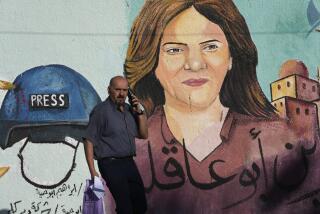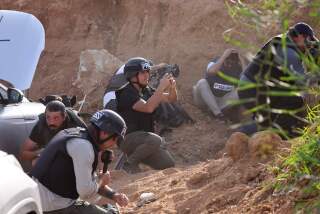Trying to Extract War From Journalism
- Share via
BANJA LUKA, Bosnia-Herzegovina — On newly liberated Bosnian Serb television, the news announcer dutifully reported a story about the Muslim head of Bosnia’s presidency: “Alija Izetbegovic, Muslim murderer.”
Oops. Not exactly the kind of language Western backers want to hear from the television and radio network that is supposed to promote democracy and reconciliation.
Transforming Bosnian Serb television from a warmongering political tool to a professional journalistic operation--the task assumed by the United States and its allies--will take time and will involve changing hearts and minds as well as pictures and news copy.
In a country where most information is imparted through TV, NATO peacekeeping troops earlier this month seized key transmitting towers from Bosnian Serb hard-liners, based in the mountain village of Pale, and placed them in the hands of pragmatists loyal to Western-backed Bosnian Serb President Biljana Plavsic.
Except for a few days recently when the hard-liners sneaked back on the air, the North Atlantic Treaty Organization action deprived indicted war crimes suspect Radovan Karadzic and his supporters of their most effective propaganda tool. Now Western officials are providing equipment and advice to Plavsic supporters in an effort to replace what they labeled “poisonous” rhetoric with something more palatable.
The efforts underline a basic dilemma in the U.S.-fashioned policy of overtly promoting Plavsic in her power struggle with Karadzic. She and many of those around her, including some who work at the television station, do not come any more naturally to the ideas of peace and brotherhood than the hard-liners the West wants to push to the margins.
Yet Washington appears determined. Negotiations with the Pale hard-liners that would allow them back on the air have gone nowhere. In fact, sources involved in reshaping Bosnian Serb TV say U.S. officials want to ensure the Karadzic clique stays off the air at least until after the Nov. 23 parliamentary elections, which the Clinton administration hopes Plavsic’s party will win.
That notion was reinforced recently when Karadzic followers hijacked the TV signal for about 40 hours, then trashed and stole equipment when they fled in the face of oncoming American troops. Until repairs are made, about 30% of the Bosnian Serb population is receiving no signal.
Meantime, the United States is delivering $700,000 in equipment to the new Srpska Radio and Television (SRT), based in Plavsic’s headquarters city of Banja Luka, and will offer basic training to its 40 reporters. A mobile TV unit, a sophisticated digital editing suite, a satellite dish and suitcases full of videotapes are being supplied to the Banja Luka station.
A U.S. government media expert was dispatched from Washington to Banja Luka to advise SRT for the next two months. “I thought my task would be to spin gold out of straw, but the attitudes are much more positive, progressive . . . [and] Western than I was anticipating,” the advisor, Paul Denig, said in an interview in Banja Luka. “That said, they need a lot of help.”
The NATO takeover of the television transmitters thrust international peacekeeping officials onto tricky ground and triggered divisive debate. When is censorship justifiable? What are the limits to free speech?
International officials say they are comfortable with their actions. The vitriolic language coming out of Pale television had to stop, they say, because it incited violence against peacekeepers, as in an Aug. 28 riot that targeted U.S. soldiers, and undermined efforts to pacify and reunite the country.
The Banja Luka faction got control of SRT gradually. In August, one transmitter was turned over to Plavsic supporters, allowing them to make a broadcast parallel to Pale’s and seen by nearly half of Republika Srpska, as the Bosnian Serb half of the country is known. As of Oct. 1, with NATO’s takeover of four transmitters, Banja Luka controlled all SRT broadcasting.
International officials have ordered Banja Luka SRT to move its ramshackle operation out of Plavsic’s presidency building and to submit to the same oversight and supervision required of all media in Bosnia-Herzegovina.
By most accounts, Banja Luka SRT in the last couple of weeks has toned down propaganda, given space to opposition political parties and halted flagrant violations of peace accord rules on media.
“They continue to try to prove they are pro-Serb, but in a more modest way,” said Dusan Babic, an editor at Media Plan, a nongovernmental organization that studies the news media in the former Yugoslav federation. “They generally avoid inflammatory and hateful speech. There are marked differences in their editorial policy” compared with Pale TV.
Initially, the new SRT committed many of the same sins as the old. Where Pale TV was a mouthpiece for Karadzic, Banja Luka served the same function for Plavsic. Items one, two and three on the nightly news were likely to be about Plavsic.
More recently, Banja Luka SRT gave relatively balanced coverage to Momcilo Krajisnik, the Serbian member of Bosnia’s three-man presidency, who is an archrival of Plavsic. Coverage of Muslims remains problematic: SRT usually ignores or relegates news about the Muslim-Croat half of Bosnia to the bottom of the newscast. And it sometimes slips into the same racist rhetoric that was typical during the war.
A difference, however, is that when international officials raise the issue--as they did with the “Muslim murderer” reference to Izetbegovic--Banja Luka SRT corrects itself.
But the network continues to lack sound journalistic judgment, and news shows sometimes seem confused, say monitors who watch it daily.
Now broadcasting for 15 hours a day with limited studio facilities and only four cameras, Banja Luka TV says it is technically unable to cover the events and regions that it should. The station fills its air time with bland educational programs, along with a few movies and soap operas.
“Professional journalistic parameters seem to be missing,” said an international official who keeps track of SRT broadcasts. “Or they show no logic in how they play stories. It seems to be lack of organization more than specific policy.”
The most serious problem facing those who want to reform TV anywhere in Bosnia is changing attitudes shaped and perverted by war and strident us-against-them nationalism.
Marinko Ucur, an editor and sometimes-anchor in the Banja Luka studio, is a perfect example. He now stresses the importance of professional journalism and the need to evolve beyond what he describes as reporters’ wartime role: “instruments in the struggle against a common enemy.”
Just weeks before he and other Banja Luka-based journalists took control of SRT, however, Ucur was singled out in a monitoring report, by Media Plan and the Institute for War and Peace Reporting, for his anti-West commentaries.
In several broadcasts on what was still Pale-controlled television, Ucur ranted on about a world conspiracy against the Serbs, questioned whether Bosnian Serb soldiers had really raped Muslim women and complained that “so-called mass graves” failed to yield significant numbers of Muslim bones. He groused that the international war crimes tribunal at The Hague was a product of “media Satan-ization” of the Serbs that “hounds” Bosnian Serb “hero” Karadzic.
“I am not ashamed of my past,” Ucur said later, after SRT was in Banja Luka’s hands, “but now I know to think in a different way.”
Still, he said, he remains a nationalist and sees no need to report extensively on activities in the Muslim-Croat half of Bosnia.
Nikola Deretic, a 20-year journalism veteran and chief editor of Banja Luka SRT, said the station will concentrate on presenting “our reality”--Bosnian Serb reality--first, and eventually include Muslims and Croats.
Deretic said a recent broadcast featuring Muslim screenwriter Abdulah Sidran provoked scores of angry phone calls to the studio. “Honestly,” he said, “it is too early to broadcast some things.”
More to Read
Sign up for Essential California
The most important California stories and recommendations in your inbox every morning.
You may occasionally receive promotional content from the Los Angeles Times.














